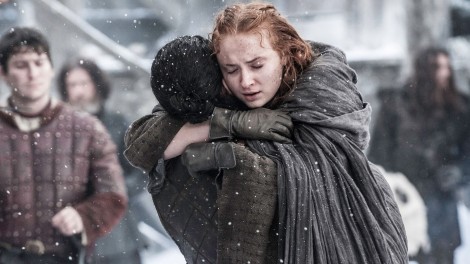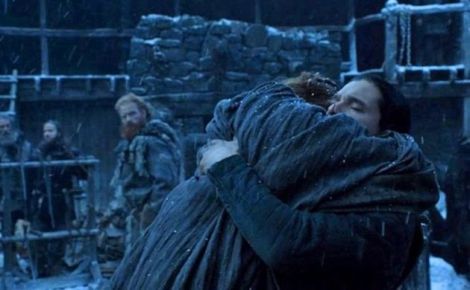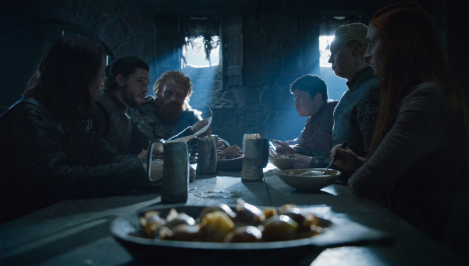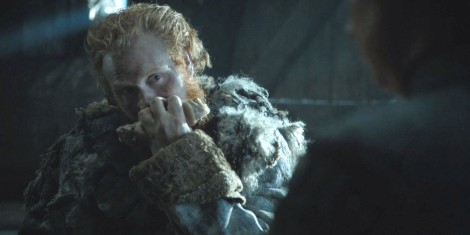
THE TIME OF WOLVES
Yes. It finally happened. Last Sunday we witnessed the first reunion of Stark family members since season one, when Ned accepted Roberts offer to be his new Hand of The King. It was the long awaited reunion of two, now eldest remaining, Starks – Sansa and Jon – under condition that Benjen is dead, which I will start believing once I see his corpse. To understand the epic proportions of this event worthy of celebration, we have to discuss few points from the past, which show didnt really focus on. Although, even without it, the fact that two Starks have met per se is worty of causing euphoria among the fans.
If you remember, during the fourth season we had a chance to see the arrival of Janos Slynt to Castle Black when he joined the Nights Watch. Janos Slynt, for those who need their memories refreshed, is a man directly (among others) responsible for the death of Ned Stark, who was sent to the Wall by Tyrion Lannister (ironically, Sansa’s first husband), for the crimes of following King Joffrey’s orders of murdering Robert Baratheon’s bastard children. Sansa, who witnessed Ned’s execution first hand, just like her sister Arya, has a list of people she secretly wishes dead. Although this is an unwritten list, whose names were never spoken alloud, Janos Slynt, the former Lord Commander of the King’s Guard, has managed to found himself on, which is evident in the following paragraph:
„Sansa stared at his ugly face, remembering how he had thrown down her father for Ser Ilyn to behead, whishing she could hurt him, wishing that some hero would throw him down and cut his head. But a voice inside her whispered, there are no heroes.”

Upon arriving to the Wall, Slynt being Slynt, managed to establish himsel as one of this „holly“ order’s leader and a right hand man to Alliser Thorne who never shied away from letting his true feelings regarding Jon show. However, Slynt’s luck drastically changed at the beginning of season five when Jon, the newly appointed Lord Commander of the Night’s Watch, determined to follow in his father’s footsteps, unsheathed his sword, the Long Claw, and used it to cut Slynt’s head off, as a punishment for his disobeyance. Interestingly enough, Jon’s intial idea was to hang Slynt, however, upon remembering his father’s words as to how a man who passes the sentence should swing the sword if he truly believes that the convicted man deserves the punishment. „A man who passes the sentence should swing the sword“ ,a sentence we first heard in episode one „Winter is coming“, is a sentence which follows Jon since the beginning and the reason why he failed to execute Yigritte and that man in front of the Nightfort during the third season. The sentence to death was not his order, nor was it his decision to kill them. It is that simple.
„ “I will not hang him,” said Jon. “Bring him here.” “Oh seven saves us,” he heard Bowen Marsh cry out. The smile that Lord Janos Slynt smiled then had all the sweetness of rancid butter until Jon said “Edd, fetch me a block” and unsheathed Long Claw.”

This information, as well as Jon’s decision to cut Slynt’s head off, become a wonderful parallel which, in the context of the earlier text, turns Jon into an unlikely hero Sansa dreamed and hoped for. Unlikely, because to make things even more ironic, Sansa Stark, just like her mother Catelyn, under whose influence she grew, never cared for Jon. At least not the same way her siblings did. In fact, she was not really kind to him either, because after all Jon, unlike her, was a bastard born. Her actions, impact of her mother’s actions, and so on, will play a key role in the creation, or rather, destruction of their relationship resulting in the fact that, while leaving for the Wall, Jon said goodbyes with everyone in Winterfell, everyone except Sansa with whom he, until this episde, never exchanged a single word.

During the fourth season, and third book („A Storm of Swords“) respectively, while she stayed in Vale under the false identity of Alayne Stone, as Littlefinger’s daughter, Sansa began to think about Jon for the first time. While building Winterfell in snow, beneath the walls of Eyrie, after all predicament she found herself in, Sansa also began to sympathize with her brother, whose position, in the new context, she was finally able to understand.
„She had always imagined the Night’s Watch to be men like Uncle Benjen. In the songs, they were called the black knights of the Wall. But this man had been crookbacked and hideous, and he looked as though he might have lice. If this was what the Night’s Watch was truly like, she felt sorry for her bastard half brother, Jon… He was only her half brother, but still… with Robb and Bran and Rickon dead, Jon Snow was the only brother that remained to her. I am a bastard too now, just like him. Oh, it would be so sweet, to see him once again.”
Reading this paragraph it becomes easy for readers to focus on her calling Jon her “bastard half-brother and a bastard” here, but if we look a little deeper, we notice how she also thinks to herself that she is a bastard (although she is not) and that she focuses on the fact that the singers called the Watch “the black knights of the Wall”. This is important because we know what a huge premium Sansa was putting on the idea of knighthood. By seeing Jon as a knight we learn that her opinion on him has changed. She respects him now, and even admires him. And although superficially incredibly divergent, Sansa and Jon, actually did look at the world in somewhat similar ways: each believed in the stories and songs, in honor-just different stories and different methods of honor. Each believed Benjen Stark was the prototypical Watchman. Jon believed all Watchmen were true and honorable, Sansa believed all knights were true and honorable. They each had specific ideas about how a specific place was supposed to be (the Wall and the South), and each of them had those ideas dashed by reality.

Following her line of thought, we come to realize that Sansa, completely aware of this noose around Jon’s neck also known as the oath to the Watch, actually seems to be looking for any potential plotholes which will open the way for Jon on his own path to glory, as equal to the rest of the best and brightest Westeros has to offer.

From this point of view, and now after all that has happened, her wishes turned out to be almost prophetic considering that only two books later Jon will actually succeed in cheating his own death, which will release him from the Night’s Watch for good.
THE PINK LETTER
After the embrace we have been waiting for years, and after the nostalgic recollections on their childhood, Sansa (who in this new setup seems to care more about Winterfell than Jon) proposes an alliance to her brother, asking him to head south together with her, the Free folk, and the rest of the houses still loyal to Ned Stark, and reclaim their home from the hands of the psychotic Ramsay Bolton. At first, and for unknown reasons, surprisingly (both to us and to Sansa), he denies this offer. Is this new Jon, who now clearly lacks initiative and will, a result of Melissandre’s magic, or is it simply a plot hole that the writers are just now deciding to fill? I would say the latter, because near the end of this episode, the best in this season so far, Jon finally receives the letter, known among the fans as “The pink letter”. It represents a move that has, in the books, cost Jon his life. And no, he didn’t lose it because he has decided to let the Free folk through the gates of Castle Black, no. Ramsay, and Ramsay alone is responsible for the stream of events in the last chapter of “A Dance with Dragons”, when in frustration he sends the letter to Jon in which, aside from informing him that he has killed Stannis, captured Mance and now rules Winterfell, he also sends an open threat to the Night’s Watch, which he plans to attack from south unless Jon returns (the false) Arya and his Reekback to him.

“Your false king is dead, bastard. He and all his host were smashed in seven days of battle. I have his magic sword. Tell his red whore.
Your false king’s friends are dead. Their heads upon the walls of Winterfell. Come see them, bastard. Your false king lied, and so did you. You told the world you burned the King-Beyond-the-Wall. Instead you sent him to Winterfell to steal my bride from me.
I will have my bride back. If you want Mance Rayder back, come and get him. I have him in a cage for all the north to see, proof of your lies. The cage is cold, but I have made him a warm cloak from the skins of the six whores who came with him to Winterfell.
I want my bride back. I want the false king’s queen. I want his daughter and his red witch. I want this wildling princess. I want his little prince, the wildling babe. And I want my Reek. Send them to me, bastard, and I will not trouble you or your black crows. Keep them from me, and I will cut out your bastard’s heart and eat it.
Ramsay Bolton, Trueborn Lord of Winterfell.”
It is of course a precedent because until now, all the way since the beginning of the Night’s Watch, no lord has ever made an open threat to the Lord Commander of the Night’s Watch, let alone has ever planned to attack them. Faced with a difficult decision, but also driven by his personal emotions, Jon decides to march south and face Ramsay Bolton, head on. That same night, just after issuing this order, a number of brothers led by Bowen Marsh decide to murder Jon by stabbing him repeatedly in the chest and the belly. And, you know the rest.

So the introduction of the “Pink letter” in this particular time and moment, some would even say too late, becomes another in the line of McGuffins we saw this year and which is actually intended to bring the reluctant, lethargic Jon from the point A to the point B, something that was discussed earlier on. That said, Sansa is the winner here because has succeeded and got what she wanted – a march on Winterfell – ironically, with the help of her second husband, Lord Ramsay Bolton
NATURAL BORN KILLER

To all of those who still live under a false illusion that Umbers are in fact playing a long con, that Shaggy is still alive and that Rickon actually stands a chance at surviving this season, it is safe to say that Ramsay showed the true nature of things, by adding another name to his kill list. This time, as expected, it was Osha who lost her life. The same trick did not bear the same fruit. Female manipulation could’ve worked on an arrogant boy such as Theon, however, Ramsay is, unlike Theon, utterly unpredictable, and in case you had any doubts, completely fear deprived, which makes him a dangerous enemy. On the other hand, despite the aforesaid characteristics, we have to acknowledge that as a Lord, whose symbol is a flayed man; Ramsay failed to show a high level of skills in his art of peeling apples.
THE WHITE SAVIOR COMPLEX
In literature, history as well as popular culture, the phrase “white savior” is a narrative trope in which a white hero rescues non-whites from their own plight. This trope has a long history, especially in the American culture, which usually portrays the savior as a messianic figure that often learns something himself or herself in the process of rescuing. Last night we had a chance to see that Daenerys, as an epitome of the “white savior” in the show, unfortunately, learned nothing on her path. You will think me harsh. You will say I am overreacting. But let’s be objective for a moment, let’s put aside how epic of the said moment was for a brief moment and let’s focus on the following question: How many times are we about to witness the scene in which Daenerys Targaryen, after apparent defeat, triumphs in front otf thousands and thousands of poor non-white people who in awe worship this Godess by kneeling at her feet?

If we do not try to reason this scene out, and if we ignore the words of the author who created this character, and who, on multiple occasions said how this was a one-time thing, how she didn’t burn in Drogo’s funeral pyre not because she is a Tragaryen (who don’t burn, because they do) but because of the blood magic she invoked while giving birth to the dragons, this would have been a fantastic end of the episode. However, like in Osha’s case, the same trick did not bear the same fruit, which is why my excitement could not level up to the one I felt five years when Daenerys emerged unharmed from the fires with the newborn baby dragons. It was an extraordinary scene that tied me to this story forever. Repeating it by the means of compilation ruined the magic of it. That said, all of the inconsistencies that happened during this scene like – among those 10 000 Dothrakies present only two of them guarded the doors of the temple, which hosted ALL important khals; it doesn’t matter that someone actually had to soak the temple into gasoline for it to burn that fast and with such ferocity; or that her hair got scot-free again; or that no one, not a single person noticed the death of the guards, not even that Khals are complete losers – none of these matter. What matters is the constant repetition created as a result of bad writing, and repetition is a mother of knowledge which Benioff and Weiss, just like Daenerys, can’t seem to grasp in a coherent manner.

Compilation of the first season’s finale (the birth of dragons), third season’s finale (worshiping the Mother of Dragons), numerous cut scenes (best example is the roasting of Nakloz), as well as their constant recycling, Benioff and Weiss were able to create a collage which dramatically weakened this, otherwise, great episode. It also showed Daenerys gathering yet another army, which she will, like every other time thus far (remember the slaughtered Dothrakies in Quarth, the ships, which like Rasmay’s dogs vanished into thin air, Unsullied who came down to Greyworm, and ultimately the freed slaves who were butchered at the dragon pit by the Sons of Harpy), lose somewhere in the desert while going back to Meereen. And if, by any chance Drogon decides to show, chances are she will hop on his back and head to the unknown direction, leaving her people in dust without blinking an eye. Because, after all, this is the Targaryen way. With Fire & Blood into new conquests because all people that are not you, and whose culture is a bit different then yours, deserve to be liberated if it is in your best interest. From themselves even, if needs be. This is Benioff & Weiss logic. And the reason why this scene is so problematic.
WORST OF THE EPISODE

-Constant continuity errors in the narrative
-Endless speeches of the otherwise great Jonathan Pryce
-Bran not showing up
-Jaime Lannister, the youngest knight in the history of Westeros, Lord Commander of the King’s Guard and an eternally henpecked man, who is clutching at Cersei’s heel for what seems like eternity but has actually been just three years.
-Petyr Baelish’s domination in the Vale…which will provide him with the opportunity to save Winterfell, he actually worked hard to bring down. Just great. The North does not remember but here comes Petyr Baelish to save Sansa’s day.

-The arrogant oversights of Petyr Baelish, a master of his craft, who managed to somehow misjudge Ramsay Bolton. Is it possible that the cunning master of the game loses his touch?
-Jon’s insecurity and a lack of will to fight for Winterfell. In what universe could this ever happen?
-Jorah, the old timer, is actually useless
-Osha’s untimely death
-Daenerys forcefully pulls an ace from her sleeve again
-The kneeling of non-whites in front of the pronouncedly white queen has become not only predictable, but a bit boring as well
-The tainting of the fantastic finale of the first season by recycling scenes. If you repeat one scene over and over again, it starts to lose its meaning and importance, thus turning from a special scene into a completely ordinary one
-Speaking of recycling and constant repetition, a little advice for the end: remember that every time you see Ramsay with a knife in his hand, in the next couple of minutes someone dies. Especially if the knife turns up in a close up, it is certain
BEST OF THE EPISODE

-Sunday, Tormund is in love.
-Edd’s expression when he noticed the looks exchanged between Tormund and Brienne. Priceless.

-Brienne’s not so subtle threat to Melisandre of Ashai
-Brienne’s upfront, blunt confession of killing Stannis. Finally we can put at rest those theories that the King is alive and kicking.
-Creation of the atmosphere, through this wonderful interaction, which hints at Davos’ possible discovery as to how Shireen died. The chances are the Red Woman will be held responsible for her past sins. Mayhaps even twice. Once for Renly and once for Shireen. Does not matter, déjà vu already is the norm in this series. That said, if we have not witnessed once scene at least twice, it is as it never happened.
-Davos’ reaction to Melisandre’s remark how Jon is The Prince That Was Promised, and not Stannis as she always claimed. Dear Davos, women are fickle creatures. You should have learned that by now.
-The entireinteraction between Asha and Theon. It was wonderful.
-Decision to march on Winterfell
-Brienne, Pod, Sansa, Edd, Tormund, Jon and Davos. What a fantastic team they make!
Best quote: “Where will we go? The only place we could go. Home.”
4/5
Text written by: Monika Ponjavić